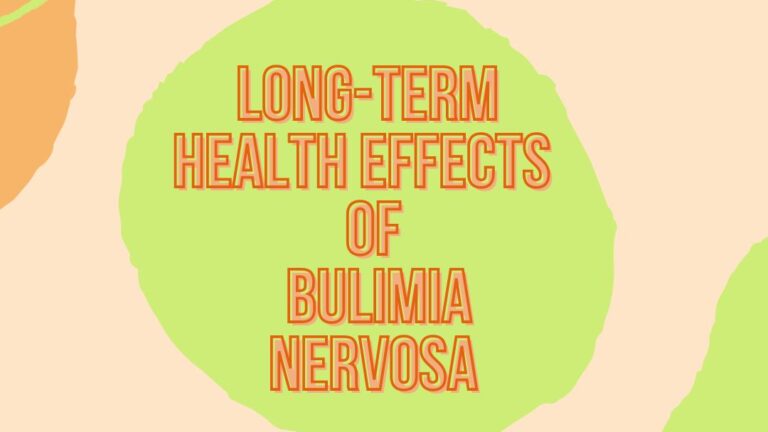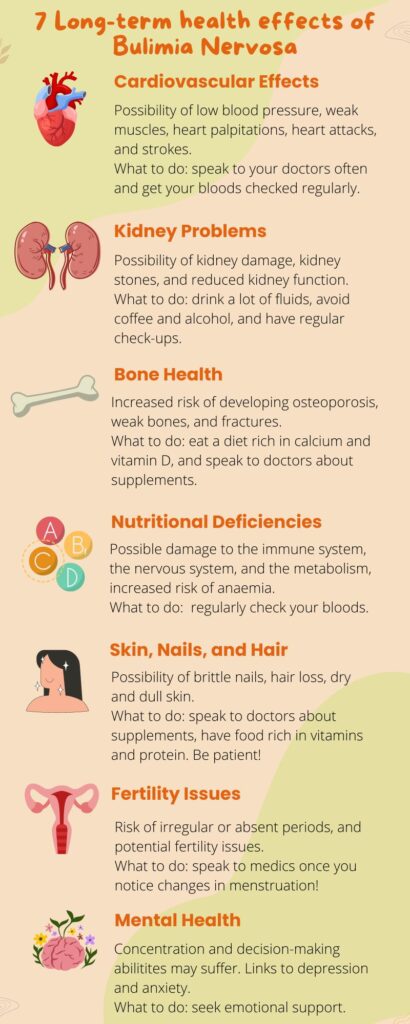(Written by Esin Hyuseinova, student dietitian. Supervised and reviewed by Priya Tew, RD)
The long term effects of bulimia are something that can really impact your health. In this blog post we are going to take a dive into how this eating disorder can affect your body in the long and short term.
Let’s start with a definition:
Bulimia Nervosa is an eating disorder characterised by regular episodes of overeating, often followed by making yourself sick, which is known as self-induced vomiting or purging. Bulimia can also include extreme exercise, strict dieting, or laxative use.
Research shows that around 40% of people affected by an eating disorder suffer from Bulimia Nervosa, which shows why it is important to consider the damage this might cause to someone’s body over time.
It can be easier to focus on the immediate negative effects seen when living with an eating disorder, but it is also important to think about the effects we might see in our long-term health.
Short-term Health Effects of Bulimia on the Body:
These are some of the short-term health effects you might notice when you are suffering from bulimia. It is important to note that whilst these can seem concerning they are reversible and treatable. Giving you a really great motivator to work on recovery.
Oral Health
One of the most frequently seen short-term side effects of bulimia comes from self-induced vomiting (also known as purging). This is something that over time can lead to dental issues like erosion, tooth decay, or gum problems. The stomach acids start to eat away the teeth leading to damage that if not caught can have longer term impacts on your teeth.
Taking care of your teeth is therefore extra important, and you should have regular check-ups with you dentist to prevent any serious problems developing.
Electrolyte Imbalances and Heart Risks
Vomiting or purging can have further impacts on your body. It can disrupt the level of certain blood electrolyte levels in the body such as sodium and potassium. This can increase the risks of heart irregularities or complications in the heart’s health.
This shows why it is important to be in frequent contact with your doctor and have your bloods checked.
Gastrointestinal Issues
If you suffer from bulimia nervosa you can also experience acid reflux, which is a particularly nasty side effect of frequent vomiting. Other side effects include tears in your stomach and intestines, or sores in your stomach’s lining. These can be very painful and could result in infections or more serious problems if not treated in a timely manner.
Swollen Glands
Making yourself sick often leads to stomach acid causing the salivary glands near the jawline to become swollen or painful, and it can also cause difficulty eating. However, this can usually be treated easily, and the swelling often goes down once vomiting has stopped.
Russell’s Sign
Russell’s sign is another side effect that can be seen in bulimia. It is when calluses on the knuckles or back of the hand are caused by repeated self-induced vomiting. It can often be used by doctors to diagnose bulimia.
Ignoring the warning signs of bulimia might lead to serious consequences on your long-term health, and it is important to deal with them as soon as you notice their presence. Let’s move on to look at the long term effects of bulimia.
Long term effects of bulimia, health consequences and how to prevent them:

The long term effects of bulimia on the Cardiovascular system:
One of the most serious consequences of bulimia nervosa is the harm to your heart. When you often make yourself sick you can easily get dehydrated, which leads to the body’s electrolyte balance getting disturbed. This may lead to heart attacks or strokes. It can also cause low blood pressure, weak heart muscles, or heart palpitations (when your heart is beating very fast or feels like it’s skipping a beat).
Speaking to your doctor often, and having your bloods checked regularly can help you prevent these problems in the long term.
The long term effects of bulimia on the kidneys:
Frequent vomiting and dehydration can also affect your kidneys. The kidneys help maintain the body’s electrolytes levels. If your electrolytes are imbalanced for long periods, this might cause damage to your kidneys, their function, or even cause kidney stones.
Drinking enough fluids and avoiding coffee, and alcohol can help you protect your kidneys, but it is important to have regular check-ups to catch any issues early.

The long term effects of bulimia on bone health:
Suffering from bulimia can also increase your risk of poor bone health and developing osteoporosis. Osteoporosis is a bone disease, which makes your bones weaker and fragile. This can lead to increased risk of fractures, pain and disability, a huge reason to work on recovery.
Nutrient deficiencies, often seen in eating disorders, like not getting enough vitamin D, phosphorus, or calcium, can lead to low bone density and more fractures.
The resulting condition osteoporosis is unfortunately often irreversible, and it is important to seek help in a timely matter. Your doctors can help you get the correct supplements in order to prevent these problems, but eating a balanced diet rich in calcium and vitamin D is also important.
Nutritional Deficiencies:
Nutrient deficiencies can also cause various other health concerns. Nutrient deficiencies affect all organs and functions of the body. For example:
- Not getting enough iron can result in anaemia, which makes you feel weak and tired.
The lack of zinc, B vitamins, and essential fatty acids like omegas 3 and 6 can affect your immune system, metabolism, and nervous systems.
Getting your bloods checked regularly can help you notice these issues earlier and take actions to prevent the consequences.
The long term effects of bulimia on the skin, nails, and hair:
Nutrient deficiencies can also result in visible changes to your appearance.
Your nails may become brittle and develop white spots because of lack of important nutrients like biotin.
The lack of protein and vitamins can cause hair loss and make your hair look brittle and dull.
Your skin can start to appear dry and dull because of dehydration and lack of important vitamins and minerals. You might also get wounds, which are slower to heal.
Speaking to your doctors about supplementation and having a vitamin and protein rich diet can help you keep your skin, nails and hair healthy. It is important to be patient, as it might take some time for your body to recover.
Fertility Issues
Bulimia can disturb your hormones, similar to other eating disorders. Hormonal balance is important in maintaining a regular menstrual cycle.
Frequent changes in weight often result in irregular or absent periods, which can lead to fertility issues in the long-term. Maintaining a healthy pregnancy might also be a challenge.
Once you’ve stopped purging, your body will restore you hormonal balance over time, but it is still important to speak to your medical team as soon as you notice any changes in your cycle.
The long term effects of bulimia on mental health:
It is also important to look after your mental health when suffering from bulimia, or any other eating disorders, as they are often linked to depression and anxiety disorders.
Bulimia’s effects on the body might also cause damage to your ability to concentrate and make decisions.
People living with eating disorders often experience feelings of shame and guilt that have to do with their eating habits and relationship with food.
Seeking help with the emotional side of dealing with an eating disorder is just as important as taking care of your body’s physical health.
Seeking Help for the long term effects of bulima and the Importance of dietitians
Noticing the signs early and seeking professional help quickly is crucial for your recovery. Your medical team can help you get the right checks and treat any problems as soon as they occur. Speaking to a psychologist or an eating disorder therapist can help you recover in a healthy way.
An eating disorder dietitian plays a very important role in your recovery.
They can help you choose the right foods to correct any nutrient deficiencies, and prevent the problems they might cause. They can also give you a lot of knowledge about healthy eating patterns and tips on breaking the binge and purge cycle, as well as help you develop a suitable food plan.
A specialised dietitian can also support you throughout your recovery by monitoring your progress and guiding you in your journey.
Conclusion
The long-term health consequences of Bulimia can be very serious. It is important to seek help early and to get checked-up regularly to correct any issues early on.
Raising awareness and spreading knowledge about the serious consequences this eating disorder might have on your or your loved ones’ health is crucial in the path to recovery.
